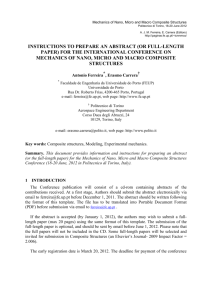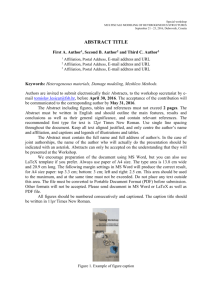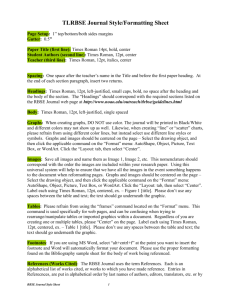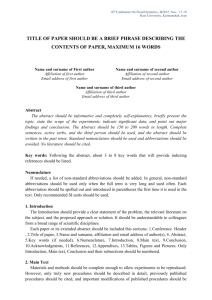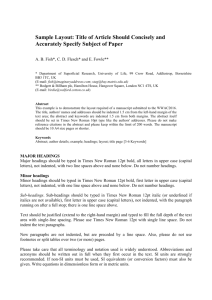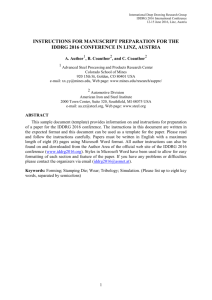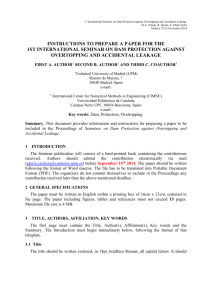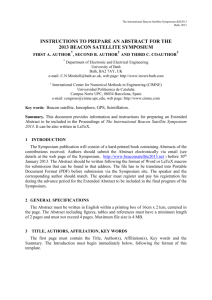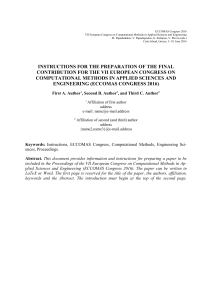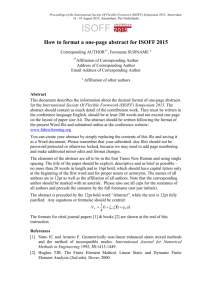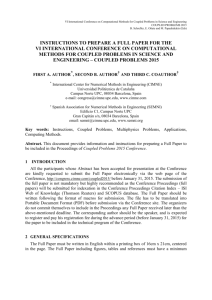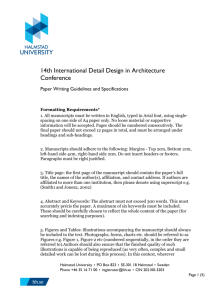here
advertisement
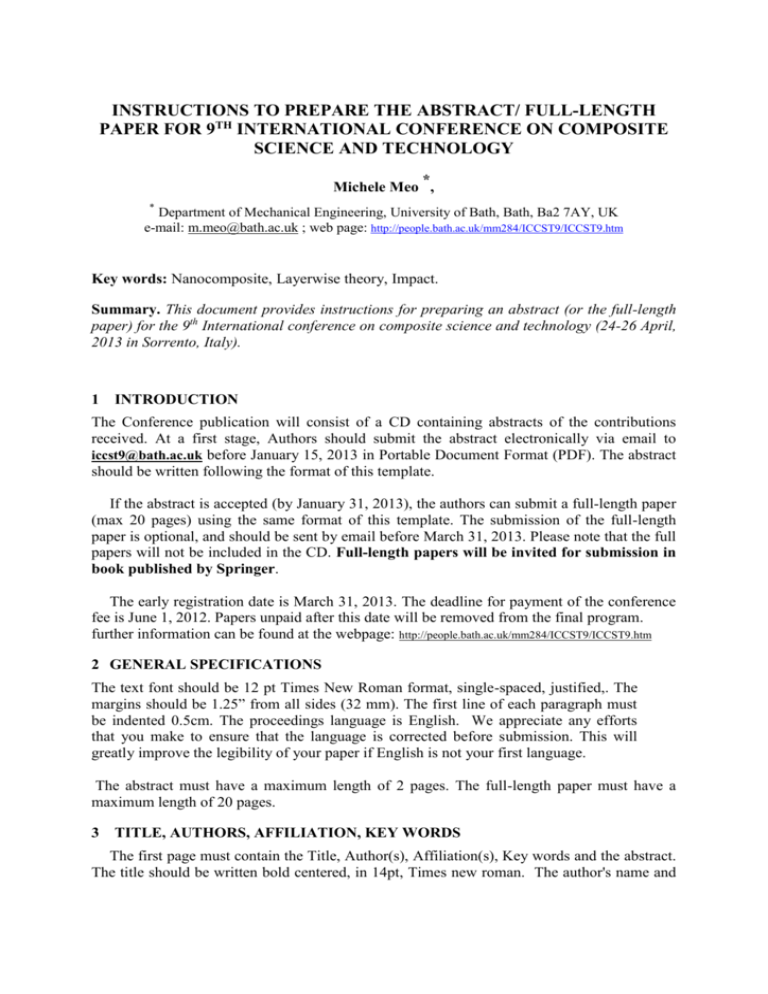
INSTRUCTIONS TO PREPARE THE ABSTRACT/ FULL-LENGTH PAPER FOR 9TH INTERNATIONAL CONFERENCE ON COMPOSITE SCIENCE AND TECHNOLOGY Michele Meo *, * Department of Mechanical Engineering, University of Bath, Bath, Ba2 7AY, UK e-mail: m.meo@bath.ac.uk ; web page: http://people.bath.ac.uk/mm284/ICCST9/ICCST9.htm Key words: Nanocomposite, Layerwise theory, Impact. Summary. This document provides instructions for preparing an abstract (or the full-length paper) for the 9th International conference on composite science and technology (24-26 April, 2013 in Sorrento, Italy). 1 INTRODUCTION The Conference publication will consist of a CD containing abstracts of the contributions received. At a first stage, Authors should submit the abstract electronically via email to iccst9@bath.ac.uk before January 15, 2013 in Portable Document Format (PDF). The abstract should be written following the format of this template. If the abstract is accepted (by January 31, 2013), the authors can submit a full-length paper (max 20 pages) using the same format of this template. The submission of the full-length paper is optional, and should be sent by email before March 31, 2013. Please note that the full papers will not be included in the CD. Full-length papers will be invited for submission in book published by Springer. The early registration date is March 31, 2013. The deadline for payment of the conference fee is June 1, 2012. Papers unpaid after this date will be removed from the final program. further information can be found at the webpage: http://people.bath.ac.uk/mm284/ICCST9/ICCST9.htm 2 GENERAL SPECIFICATIONS The text font should be 12 pt Times New Roman format, single-spaced, justified,. The margins should be 1.25” from all sides (32 mm). The first line of each paragraph must be indented 0.5cm. The proceedings language is English. We appreciate any efforts that you make to ensure that the language is corrected before submission. This will greatly improve the legibility of your paper if English is not your first language. The abstract must have a maximum length of 2 pages. The full-length paper must have a maximum length of 20 pages. 3 TITLE, AUTHORS, AFFILIATION, KEY WORDS The first page must contain the Title, Author(s), Affiliation(s), Key words and the abstract. The title should be written bold centered, in 14pt, Times new roman. The author's name and surname should be written centered, in 12pt boldface Times New Roman, 12pt below the title. Author's affiliation should be written centered, in 11pt Times, 12pt below the list of authors. Max six keywords are allowed. They should be written left aligned, in 12pt Times New Roman, and the line must begin with the words Keywords: boldfaced. A 12pt space should separate two different affiliations and keywords from the affiliations. 4 TEXT The normal text should be written single-spaced, justified, using 12pt Times New Roman with the first line of each paragraph indented by 0.5cm. 5 FIGURES All figure should be numbered consecutively (1, 2, etc.), captioned and included in the text. The caption title should be written centered, in 10pt Times New Roman and placed below the figure within the manuscript using the following format: “Fig.1 Schematic diagram of the experimental apparatus”. A 6pt space should separate the figure from the caption, and a 12pt space should separate the upper part of the figure and the bottom of the caption from the text. 6 TABLES Each table should be numbered consecutively (1, 2, etc.) and captions should be placed below the table within, for example : “Table 1 Mechanical properties”. The caption should be 10pt Times New Roman. A 6pt space should separate the table from the caption, and a 12pt space should separate the table from the text. Young Modulus 20GPa Table 1 : Example of the construction of one table 7 FORMULAE Formulae should be type-written, centered, and numbered, using Arabic numbers leaving a 6pt space above and below to separate it from the text. A single line equation is: F=ma 8 (1) FORMAT OF REFERENCES References should be quoted in the text by numbers [1,2] and grouped together at the end of the Abstract/ Full paper in numerical order as shown in these instructions. REFERENCES [1] Towo, A. N., Ansell, M. P., Pastor, M.-L. and Packham, D. E., 2005. Weibull analysis of microbond shear strength at sisal fibre-polyester resin interfaces. Composite Interfaces, 12 (1-2), pp. 77-93. 2
